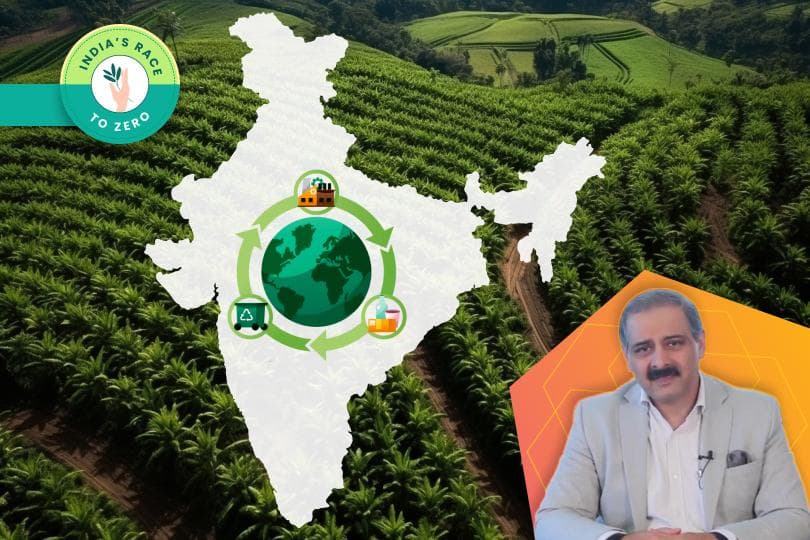Championing the Circular Economy
Re Sustainability’s Innovative solutions for the country's sustainable growth.
Masood Mallick

The sustainability revolution promises to be the third major social and economic turning point in human history, following the Neolithic Revolution—which transitioned humanity from hunter-gathering to farming—and the Industrial Revolution. As India began its industrialisation, the pressing need for robust environmental infrastructure and efficient waste management systems became increasingly apparent.
Approximately 30 years ago, our company, “Ramky Enviro”, was established to tackle waste management's scientific and economic aspects. Before this, waste management was informal and disorganised, lacking industry recognition and depending on manual labour and scavenging. Five years ago, we rebranded “Ramky Enviro” as “Re Sustainability Limited", redirecting our focus towards resource management and the circular economy.
Our shift signifies viewing waste as a resource, prompting us to repurpose rather than merely dispose of it. We envision a future where all materials serve as feedstock for recycling or resource recovery, driven by environmental and economic imperatives. By scaling our operations, we enhance viability, traceability, and the value-added to waste, strongly emphasising material recovery, waste-to-energy conversion, and power generation.
Today, we stand as India’s largest waste management company, handling 8 million tons of waste across diverse sectors. Operating in 11 countries, our expertise extends beyond waste collection and disposal to encompass comprehensive resource recovery and circular economy solutions. This journey has been remarkable and impactful, particularly in the volume of waste recycled.
Turning Waste into Circular Economy Solutions
Re Sustainability derives value from four main sources, considering three contexts: environmental and social, economic, and strategic.
Our primary focus is managing hazardous regulated waste streams, covering over 65% of industrial waste in India, and serving numerous industries and healthcare establishments daily. We handle waste for over 45,000 healthcare facilities, converting some regulated wastes into alternate fuels and raw materials. Additionally, our emphasis on urban sustainability solutions involves collecting and managing household waste in major and smaller cities, to maximise recycling efforts.
Our power generation segment focuses on producing Refuse-derived fuel (RDF ) from collected waste for power generation. With operational plants in Delhi, Hyderabad, and Rewa, along with ongoing projects in Mumbai, we’re actively developing waste-to-energy initiatives across India. In our urban sustainability solutions business, we offer ReCollect, providing on-demand waste collection, segregation, and environmental support services for institutions such as IT parks and office buildings.
Our Circular Economy Services segment focuses on high-value recycling, integrating recycled materials into various products, from construction materials to consumer goods like plastics. With plants across India, we process construction and demolition waste into recycled materials, significantly reducing carbon footprints. Notably, we recycled all demolition waste from the Supertech building in Noida, transforming it into new construction materials. Additionally, we recently commissioned India’s first fully integrated refinery for recovering precious metals from electronic and industrial waste, further demonstrating our commitment to sustainable practices.
Our newly commissioned whole-car recycling plant in Jhajjar ensures efficient and sustainable recycling of end-of-life vehicles, maximising material recovery. Through a mechanised and scientific process, we recover valuable materials like glass, rubber, and metals, contributing to our circular economy efforts. Additionally, our Integrated Sustainability Solutions division offers tailored environmental solutions for industries and institutions, helping them measure their sustainability footprint and address pollution effectively with customised infrastructure and technology.
Operating in 20 locations across India, we provide tailored sustainability solutions for diverse industries. From power companies to software firms, we address unique sustainability challenges with effective, customised solutions. Whether it’s a tannery in Kanpur, an explosives plant in Jharkhand, an aluminium smelter in Orissa, or a food company in Karnataka, we offer tailored environmental solutions. This applies to software companies in Pune as well. We provide both soft and hard solutions, delivering end-to-end services.
Our differentiation lies in outcome-based services. We deliver tangible results, not just information or consulting. We assess your current sustainability performance and commit to improving it, with payment contingent on our success. If infrastructure is needed, we design, construct, and install it at our expense, embodying our approach to sustainability as a service.
We’re essentially “Uberizing” the environment, offering sustainability as a service. Reach out to us to enhance your sustainability efforts; payment depends on achieving outcomes, unlike traditional approaches. Beyond India, we have a significant presence in Singapore and over 2000 colleagues, with operations in the Middle East, Africa, and North America, establishing a global footprint.
India’s Tech Boom Calls for Sustainable Waste Management
India exhibits a remarkable dichotomy in its technology consumption trends. While our utilisation of technology hardware remains relatively low on a global scale, it is growing at the fastest rate worldwide. India stands out as the fastest-growing tech market, with data consumption levels on par with global standards. However, our hardware usage remains modest, indicating the early stages of technological penetration.
Historically, India’s per capita waste, including electronic waste, was lower than in the West but is rising rapidly. Pre-COVID, urban India produced about 400 grams of municipal waste per person daily; post-COVID, this surged to around 700 grams due to increased online shopping. In the tech sector, rising mobile phone usage contrasts with shorter device lifespans. Phones that once lasted five years are now replaced every seven months, generating more waste. While some components are locally made, most critical materials like lithium, cobalt, nickel, and copper are imported. Additionally, 70-80% of plastics, derived from crude oil, are also imported.
This paradox of importing resources only to rapidly turn them into waste, carries economic, environmental, and geopolitical consequences, highlighting the urgent need for action. Electrifying India or promoting electric vehicles and solar panels requires addressing material circularity and reintroducing materials into the economy indefinitely. Achieving this at scale is challenging but presents a major business opportunity.
We acquire the world’s best technology and adapt it for India, innovating and developing local solutions where needed. Our goal is to sustainably reintegrate all types of waste, including tech waste like laptops, electronics, other goods, and specialised tech waste, back into the economy.
Identifying significant quantities of rare earths and precious metals in e-waste, we have developed expertise in recovering them. Adopting a startup mentality for swift action, we partnered with Radius Recycling, a top US recycler, to quickly learn and implement advanced techniques for extracting gold from iPhones.
Our business model emphasises agility and efficiency, developing technologies internally when possible but prioritising partnerships and acquisitions for quick access to cutting-edge solutions. This ensures rapid progress in recycling technology, aligning with our commitment to sustainability and innovation.
Swachh Bharat 3.0: Innovating Waste Management and Sustainability
The Swachh Bharat initiative has evolved from achieving Open Defecation Free (ODF) status to focusing on waste processing in Swachh Bharat 2.0, and now to Swachh Bharat 3.0. This phase emphasises responsible waste handling, biomining, landfill management, and environmental preservation to enhance resource security and resilience amidst geopolitical challenges.
Recycling valuable materials like gold and copper from electronic waste in landfills such as Ghazipur and Bhawana in Delhi can mitigate environmental issues and reduce the need for new extraction. Transforming landfill sites into eco-friendly spaces, as seen in Bhawana, demonstrates the positive impact of innovative waste management. Swachh Bharat 3.0’s focus on waste management and circular economy principles promotes sustainability, resilience, and economic security for India, though further policy adjustments may be necessary.
India’s focus on renewable energy is crucial for decarbonising the energy sector, but decarbonising materials is equally important. Construction materials, steel, consumer goods, and other products contain embodied carbon, contributing significantly to India’s overall carbon footprint, estimated at 40-45%.
True sustainability requires reducing the carbon footprint of materials by increasing the use of recycled materials. Policy support is needed to incentivise industries to adopt recycling targets and incorporate recycled materials into manufacturing. The goal is to transition towards sourcing most, if not all, materials from 100% recycled content, dramatically curtailing carbon emissions.
Re-sustainability’s Role in Water and Sanitation in India
Our strategy to address water contamination and sanitation in India focuses on two main components. First, we prioritise preventing water contamination. With 600-700 million Indians relying on groundwater due to limited access to piped water, addressing contamination is crucial. Unlike rivers, groundwater lacks self-cleansing properties, leading to persistent contamination. Using advanced technologies, we remediate contaminated groundwater, aiding millions who depend on it.
Second, we emphasise water recycling. We deploy scalable technologies to convert even the dirtiest water into clean, usable water. This is essential as water scarcity becomes more pressing, particularly in Delhi. By preventing contamination and recycling water, we address future water scarcity challenges. Our efforts contribute significantly to SDG 6, ensuring sustainable water management and access for all.
India’s Role in Global Sustainability Transformation
India’s progress toward sustainability has significantly impacted global efforts to address climate change and sustainable development. While, there is no denying that despite lower per capita waste generation, India’s growing population will increase global waste production nevertheless, India’s demographics and economy present a chance to integrate sustainability into development, setting a global example. Waste management and circular economy initiatives can spur economic growth, create jobs, and elevate society. Formalising plastic waste collection and providing training can boost social status and employment opportunities.
This approach can extend to other vulnerable segments, initiating a social revolution across
sectors and cities. We aim to establish sustainable enterprises that manage waste and promote economic empowerment and social development, showcasing how sustainability drives positive change. India’s cultural frugality emphasises resource recovery and reuse. Embracing this can shift us from Western consumption patterns to a sustainable future. Imagine every household engaged in waste management, exchanging recyclables for money through an app or service, fostering environmental sustainability and economic empowerment.
Connecting cultural heritage with modern realities is crucial. Through social movements and community engagement, we can make sustainability accessible to all. Small changes, like using recycled plastic for toothbrush handles, embody our commitment to sustainability, bringing the vision of re-sustainability to life.
